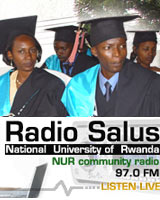Rwandan students trained as professional journalists
02-07-2007 (Paris)

Radio Salus banner on the NUR website
© NUR
Forty-nine students at the National University of Rwanda have completed training in radio production.
They are now putting their skills into practice for Radio Salus, one of five private radio stations launched after the Rwandan government reallocated licenses in 2004. After 18 months in operation, it now broadcasts 24 hours a day, seven days a week and is one of the top two private stations in the country.
The station was established at the National University of Rwanda (NUR) in Butare, as a result of a project implemented by UNESCO and funded by the European Commission to create a new, independent media outlet. Its programmes reach the entire Rwandan public and neighbouring communities in DRC and Burundi.
The training component of the project, made possible by the Funds-in-Trust of Japan, was completed in June. This 18-month training series consisted of three sets of workshops and a scholarship programme. Students working at the station developed a range of journalistic skills, from digital editing to field-recording techniques.
"The results are miracles and wonders," remarked Aldo Havugimana, the director of Radio Salus, who is proud of what the training has achieved. "I’ve watched these students turn into real journalists."
Michelle Betz, an international media consultant, led and organized the trainings. She agrees with Havugimana and believes the most successful part of the training was to watch the children grow as individuals, journalists and students.
"Pperhaps the most amazing thing is simply the fact that the station broadcasts 24/7 with only three full-time journalists and the rest are students," she said.
In a country whose media reputation was damaged as a result of its role in the 1994 genocide, the current optimism and support for this station reflects a change in public sentiment.
The station’s audience has also been increasing and the public’s feedback is overwhelmingly positive. “You should see the stacks of letters they get each week,” Betz remarked. “People love Salus and our journalists have become minor celebrities across the country.”
Radio Salus is currently establishing a second bureau in Kigali, Rwanda in an effort to produce more diverse content within the country’s local regions.
The station was established at the National University of Rwanda (NUR) in Butare, as a result of a project implemented by UNESCO and funded by the European Commission to create a new, independent media outlet. Its programmes reach the entire Rwandan public and neighbouring communities in DRC and Burundi.
The training component of the project, made possible by the Funds-in-Trust of Japan, was completed in June. This 18-month training series consisted of three sets of workshops and a scholarship programme. Students working at the station developed a range of journalistic skills, from digital editing to field-recording techniques.
"The results are miracles and wonders," remarked Aldo Havugimana, the director of Radio Salus, who is proud of what the training has achieved. "I’ve watched these students turn into real journalists."
Michelle Betz, an international media consultant, led and organized the trainings. She agrees with Havugimana and believes the most successful part of the training was to watch the children grow as individuals, journalists and students.
"Pperhaps the most amazing thing is simply the fact that the station broadcasts 24/7 with only three full-time journalists and the rest are students," she said.
In a country whose media reputation was damaged as a result of its role in the 1994 genocide, the current optimism and support for this station reflects a change in public sentiment.
The station’s audience has also been increasing and the public’s feedback is overwhelmingly positive. “You should see the stacks of letters they get each week,” Betz remarked. “People love Salus and our journalists have become minor celebrities across the country.”
Radio Salus is currently establishing a second bureau in Kigali, Rwanda in an effort to produce more diverse content within the country’s local regions.
Related themes/countries
· Rwanda
· Training of Media Professionals: News Archives 2007
Share this story:
Contact information
- UNESCO
Source















